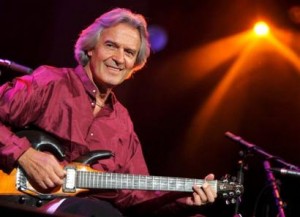Interview with Guitar God John McLaughlin
By JQ magazine’s Justin Tedaldi (CIR Kobe-shi, 2001-02) for Examiner.com. Visit his NY Japanese Culture page here to subscribe for free alerts on newly published stories.
Whether you call it electric jazz, fusion, or just good old music, John McLaughlin is the forefather of this style on the six string. From his contributions on classic albums by Miles Davis starting with the landmark In a Silent Way in 1969 to his own work with the massively influential Mahavishnu Orchestra and as a solo artist, McLaughlin is a legend who has continued to record with no signs of slowing down.
His 2009 collaboration with Chick Corea, Five Peace Band, won the Grammy Award for Best Jazz Instrumental Album earlier this year, and in April McLaughlin then released his new disc with the 4th Dimension, To the One (Abstract Logix). Following a concert at New York’s Town Hall last weekend, the artist graciously took the time to answer some questions.
Tell us about your history with Japan. What attracted you most to the culture?
I’ve been studying the cultures of Asia for many years, and I’m very attracted to the culture of Japan, in particular to the impact Zen has had on the Japanese mind and spirit. That said, any in depth study of Zen will bring you to China and the culture of Chan, the forerunner of Zen. In my opinion, there is one singular problem with religions in general: they are exclusive. To me, this exclusivity is not right. Zen and Chan’s “ways” of discovery are non-exclusive. They speak about the reality of everyone having Buddha nature, and the potential of realizing it. This is the aspect of Zen and Chan that appeals to me strongly: the non-discrimination and inclusivity of everyone.
Are there any Japanese musicians of whom you’re a fan? What other kinds of Japanese performing arts do you enjoy?
I am less of a fan of Japanese music than I am to the poetry of haiku strangely enough, though I do enjoy the koto and shakuhachi music. The Zen calligraphy is something for which I have a great admiration.
Why do you think the Japanese possess such a great interest in jazz?
For sure the answer lies in the culture of the Japanese mind. Perhaps because the spontaneity of jazz appeals to their innate sense of honesty. In improvisation, jazz or otherwise, there’s no room to lie.
Click here to read the rest of the interview.



Comments are closed.